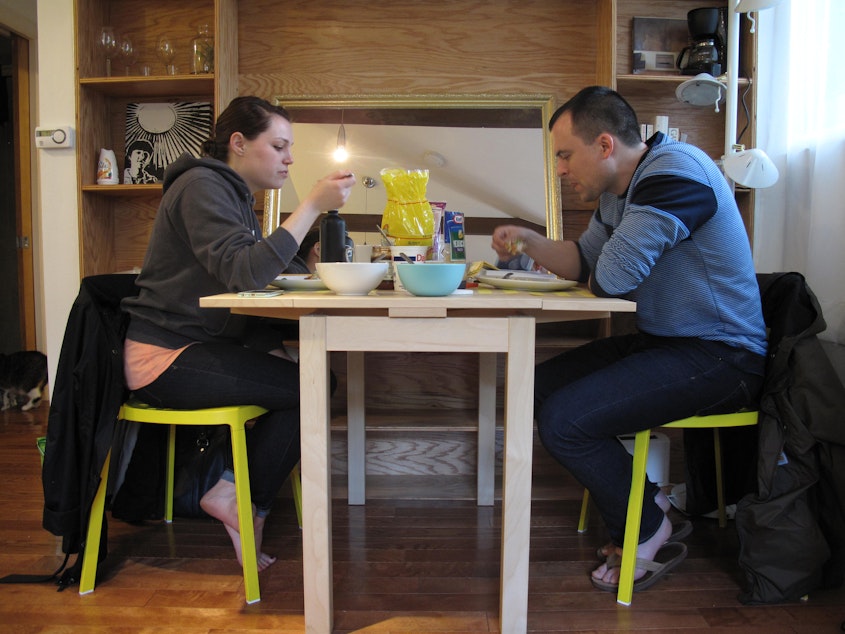If Airbnbs get taxed, should Seattle’s Convention Center get the money?

At an Airbnb apartment in Seattle, newlyweds Shannon and Eric Joehl sit down to a dinner of shrimp tacos as they discuss utilities for the house they just bought on Beacon Hill.
They relocated from Minneapolis a few months ago, living in Airbnbs as they looked for a home.
“We can’t afford a hotel, where it’s hundreds of dollars a night at a time, which is normal in Seattle even for like a basic hotel,” Eric Joehl said.
Josie the cat, meowing in the background, probably couldn’t stay with them, either.
Also: Is Seattle’s convention center really running out of space?
Also, hotels in Seattle charge extra tax—an extra 7 percent. Right now, the tax applies only to big hotels, so Airbnb guests like them don’t have to pay it.
But that may change.
The Washington State Convention Center in downtown Seattle plans to expand at a cost of nearly $2 billion. The new site would more than double convention space. The project would go up on the site where Metro currently runs the Convention Place Station bus terminal.
But the project still needs $200 million. So convention center leaders want to tax rental units like Airbnb to fill the gap.
State lawmakers in the House Finance Committee heard a pitch in February for why small hotels and short-term rentals need to pay more tax under House Bill 2015.
But, the pitch wasn’t coming from Airbnb’s usual critics, like housing activists or City Hall. Instead, it came from Convention Center leaders, including CEO Jeff Blosser. Those new taxes would fund the convention center and its proposal to expand, creating more revenue and jobs, Blosser said.
“Tons of economic benefits here: $235 million dollars in visitor spending, 2,300 new jobs that’ll be created full time, as many as 6,000 construction workers.”
The thing is, the convention center already gets millions in tax dollars. Last year, it got $77 million in taxes from rooms in big hotels.
When visitors stay there, the extra tax they pay can only be used by the convention center.
That’s by law.
And voters don’t get a say.
Still, the convention center says those taxes are not enough.
Two years ago, the estimated construction cost was $700 million. In March it was over $900 million.
“Things in Seattle are expensive,” said Matt Griffin of Pine Street Group, the developer managing the expansion project. “We are fortunate to have a strong economy where the contractors and the subcontractors are quite busy. The flipside of that means if you buy construction services, they cost more.”
But expected revenue for the project is down, Griffin said, because fewer visitors are staying in big hotels.
“Airbnb and Home Away have taken a bigger share of the market,” Griffin said. “Those firms need to pay the same taxes as the other hotels.”
Airbnb doesn’t take a position on the proposal according to Laura Spanjian, Airbnb Public Policy Director for the Northwest. The company does collect other state and local sales taxes.
But some housing advocates say expanding the convention center is not the best use of more taxes.
“That money should be used specifically in Seattle to address affordable housing issues,” said Howard Greenwich, senior policy advisor of Puget Sound Sage, a grassroots economic justice group. Short-term rentals, like Airbnb, are taking homes off the market and pushing people out of town, Greenwich said, that’s the big picture.
“We’re having a debate about short-term rentals that has to do with displacement of low income communities, immigrants, refugees, people of color,” Greenwich said. “The hotels are coming in and saying, ‘Hey! Here’s this new revenue that no one’s thought of, let’s grab that for the convention center.’”
Airbnb guests like Shannon Joehl and her husband also don’t like the idea.
“That money doesn’t send a child to school or buy a lunch for a child who currently needs it, you know, and I just have a hard time ignoring those things that I think need some help,” Shannon Joehl said.
Still, she wants to know the business case.
“Without knowing the tangible benefits, it’s hard to pick business over human needs right now,” Shannon Joehl said.
And that’s the crux of the debate—balancing economic benefits and human needs.

